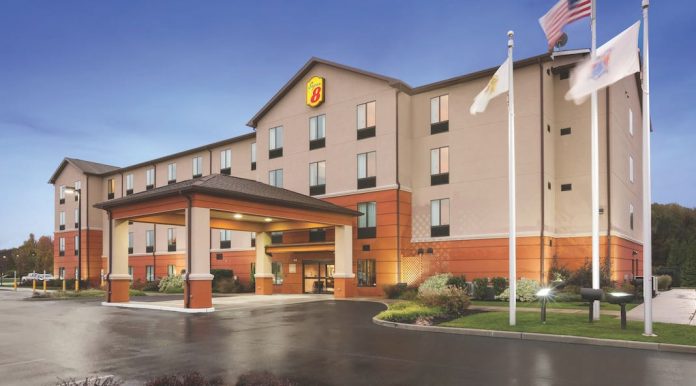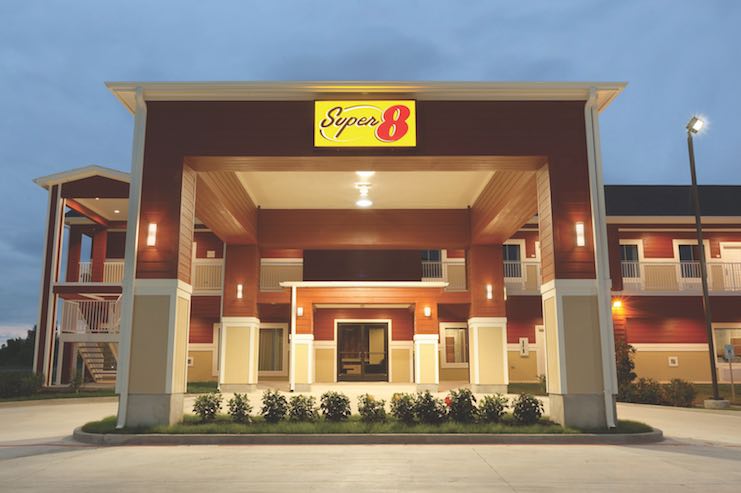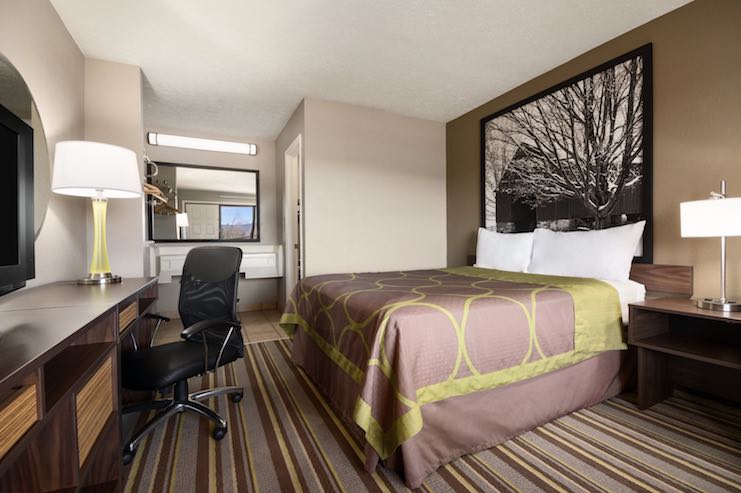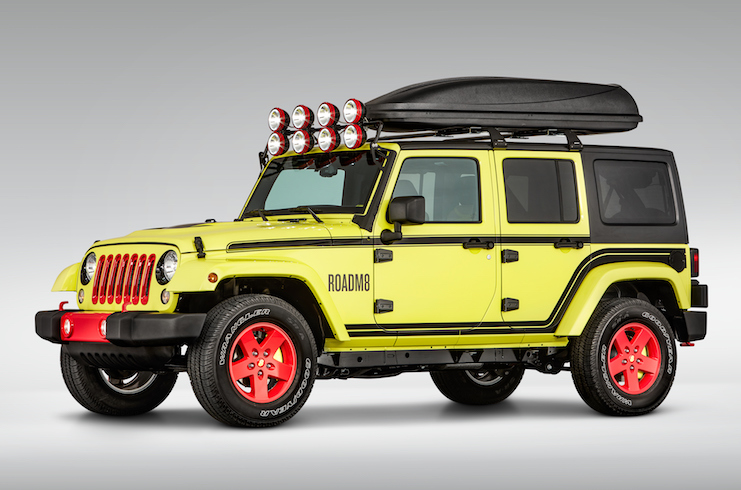
People who work in the hotel industry are typically no strangers to travel. By their very nature, hotels attract people with a passion for adventure and new experiences. This is absolutely the case for hospitality veteran Mike Mueller. Mueller has been with Wyndham Hotels & Resorts—in its various forms—for more than 20 years. He started out in strategic sourcing and partnerships, and more recently, had a decade-long stint in loyalty, ultimately running the Wyndham Rewards loyalty program. Four years ago, Mueller took up the mantle of SVP and brand leader of Super 8. Since then, he has traveled across the country, visiting more than 450 Super 8 hotels in every corner of the United States and Canada. Travel has been essential to Mueller’s success in his role, allowing him to connect with owners and developers in all types of markets.
These connections have given him the insights necessary to keep a 45-year-old brand modern and performing at the forefront of the economy segment. It also helps ensure that the brand remains a top pick for developers. LODGING recently caught up with Mueller in Minneapolis, where he had traveled to visit the Super 8 by Wyndham Bloomington/Airport, along with three dozen other Super 8 hotels, to discuss the brand’s North American re-design, the importance of loyalty, and what’s next for the world’s largest economy hotel brand.
What is the value of an economy hotel
product at this stage in the lodging cycle?
Economy hotels have immense value for developers. First, they’re a fantastic entry-level option for those looking to join the industry. They also tend to be an asset that owners can turn over to the next generation. And families keep these hotels in their portfolios—even after they move up to developing midscale or upscale products—because they’re incredibly consistent in providing a strong return. They’re easy to operate, they’re low maintenance, and they don’t have the amenity requirements that midscale or upscale hotels have, so you can run the hotel very efficiently. It’s just a good, easy, affordable product to own and operate.
From a financing perspective, they’re also really attractive to institutional investors, banks, and portfolio managers—that’s because economy hotels make money during good times and see owners through bad times.
With such a crowded market, what has Wyndham done to make Super 8 attractive for developers in 2018?
Loyalty is a major driver for any brand today. You could have great design, great amenities, and offer excellent service, but if you’re not inspiring loyalty, you’re going to be in a tough position.

So how do we inspire loyalty?First, we’ve distilled the value of Super 8 down to a very simple idea: the brand has always been clean, friendly, and affordable, and that’s not just for the guests, but it’s also for the owners.
We have also focused on consistency and delivering a best-in-class loyalty program in Wyndham Rewards that drives greater return business to hotels. Super 8 has been around for a long time, so there are a lot of construction configurations out there. In the past five years, we’ve started introducing elements that help unify our portfolio—both inside and out.
These new elements are all part of Super 8’s Innov8te program. Can you talk a bit about the program and how it has impacted the brand? The Innov8te program was created to elevate Super 8 and really prepare the brand to welcome the next generation of traveler. We started with simple things, replacing what I refer to as grandma’s bedspreads—we’ve all seen them, they’ve got those dated, floral prints—with something more contemporary: crisp, white sheets with a modern coverlet or bed scarf. Not only does it look very clean aesthetically, it shows guests that the hotel is being upgraded, which is what they want to see.
From a design standpoint, one of the coolest things we’ve done with Innov8te is our new, signature headboard, which features wall-sized black and white photography of local landmarks and landscapes that are unique to each hotel. Art can be such an afterthought in economy hotel design, and we wanted to do something different and more impactful. Instead of stereotypical “hotel” wall art, our approach has allowed us to create a unique focal point in the room, while enabling owners to do two things we think are really important: personalize their hotels and give guests a sense of place. When choosing their art, owners can pick from more than 5,000 curated images and have flexibility over which images they choose. Plus, if there’s something in their area that we don’t have a photo of, we’ll send a photographer out to snap a shot. We’ve found that when owners have this option, they jump on it.
How has Innov8te impacted the Super 8 portfolio overall?
Well, it’s had a huge impact on our retention rate for the brand. Last I checked, the vast majority of owners with valid windows or contract expirations decided to stay with us, which is just incredible. The retention rate is so high because not only is Super 8 a good product, but it delivers a high level of financial performance. Oftentimes, people in the economy segment come up against a rate ceiling, but we just don’t see that happening with our hotels. We have ADR index premiums across the board.

How do you push growth in a brand that already has a very
robust portfolio?
While Super 8 is heavily known as an American brand, we’re not limiting ourselves. A lot of our growth happens outside of North America, specifically in China. Super 8 performs extremely well there, making up about a third of our global portfolio of more than 2,800 hotels. And our success in China leads to more demand in the United States, because Chinese tourists are traveling here and looking to stay at a known entity. So it’s kind of cyclical—we’re successful in China, which leads to Chinese travelers staying in our properties in the United States and driving demand.
What else is Super 8 doing to drive growth?
We’re expanding our customer base. There’s no shortage of the core base of Super 8 guests—construction workers, truck drivers, etc.—but we’ve also done a really good job attracting the next generation of road tripper. These leisure travelers aren’t looking for extravagance, but instead an authentic, reliable place to stay while they go out and achieve their travel bucket list. We always say: They don’t travel to stay with us, but instead lean on us to enable their travel, to go where they want to go, and see what they want to see. We take that role very seriously and feel strongly that staying at an economy hotel does not, and should not, mean sacrificing on a great guest experience.
What are Innov8te’s next steps?
We’ve been extremely successful in deploying Innov8te, and so the future is all about building on that foundation. This past April, at our Global Conference in Las Vegas, we rolled out what we call the “Super 8-Year Roadmap.” It’s an 8-year plan, rolling out in two-year segments, that helps owners understand where the brand is headed and what will be required of them in terms of future renovations. This gives everyone in the system ample time to plan for updates and PIPs. And not everything has a cost. Some of our requirements our operational, related to cleaning and maintenance.
Driving Development in Unexpected Ways
Ensuring that a legacy brand doesn’t become stale is a never-ending effort—one that Super 8 has leaned into in a uniquely eccentric manner over the years. “Telling is better than selling for us, so having fun and interesting ways to communicate to the consumer that our brand is has undergone a redesign is much more effective than taking out some ads,” Mueller says.
Some examples of these out-of-the-box PR and marketing endeavors include a series of art shows during which Super 8 brand leaders—with some assistance from comedian Amy Sedaris—gave away old Super 8 hotel artwork to make room for the new hyper-local pieces, as well as the ROADM8, a tricked-out Jeep Wrangler inspired by the amenities and design features of the new Super 8 guestroom, down to the upholstery on the seats. ROADM8 debuted at this year’s New York Auto Show and has since been traveling the country to make appearances at Super 8 hotels and other brand events.
“This approach lets us bring Super 8 into guests’ consideration set in a really unique and engaging way, while showing them that the brand is current, modern, and right for their needs,” Mueller says.
We also provide each owner with a guide that helps break down costs over time to maximize ROI without shutting down a property. There’s a very sensible and measured approach to capital investment. The ultimate goal is to make sure the financial performance of the hotels makes sense for the owners and continues to grow the brand in a way that keeps owners engaged and looking to develop more hotels.
How has your travel tied in to Innov8te and the program’s goals?
We never want to be known as the company sitting on the east coast deciding what’s best for Nebraska. We need to get out there, and over the past four years, I’ve done exactly that. It helps me get in touch with the issues that are common for our hoteliers, and offer them the type of support that best boosts their business. It lends me an air of credibility—after this trip, I’ll have seen 450 Super 8 hotels. At that point, no one will be able to say, “Oh, he doesn’t know what he’s talking about.”
Do you think that other economy brands are going to start elevating their product as well?
It’s an interesting question. Actually, I need other economy brands to elevate themselves because it’s the way that we continue to lead the pack, and if we want to push rate and we want to push that Super 8 is the best in class, we need the entire segment to rise up, so that we can continue to grow on top of it.
What’s in the future for Super 8?
We open a new Super 8 somewhere in the world every two days. There is just so much growth potential in this brand. We love it. We expect to start seeing more growth in places outside the United States—China, of course, and Brazil is also on our radar. These places have an emerging middle class, much like America in the 50s. People are buying their first automobiles, and governments are building infrastructure to support travel by car. The Chinese and Brazilian middle classes want to go out and see their big, beautiful countries. It’s markets like these where we see a lot of interest in the Super 8 brand and lots of opportunity for further development.
What are your future goals for the Super 8 brand?
Honestly, my number one goal is to make sure that owners feel that the company that’s based in New Jersey cares about them, regardless of where their hotel is. My team and I spend a lot of time on the road making sure that we’re visible, that we’re accessible, that we’re not ivory tower people. You have to let collaboration be your reputation. Any owner can get in contact with me. We are elevating economy together.
I’m just a regular guy. I grew up in family of 12 children. We didn’t go on big vacations, we went to economy hotels—provided we could get three rooms—or we went camping. It makes me perfectly suited for this brand, and this brand is perfectly suited for people like me. I care about it, I feel passionate about it, and I know we can keep growing it.












